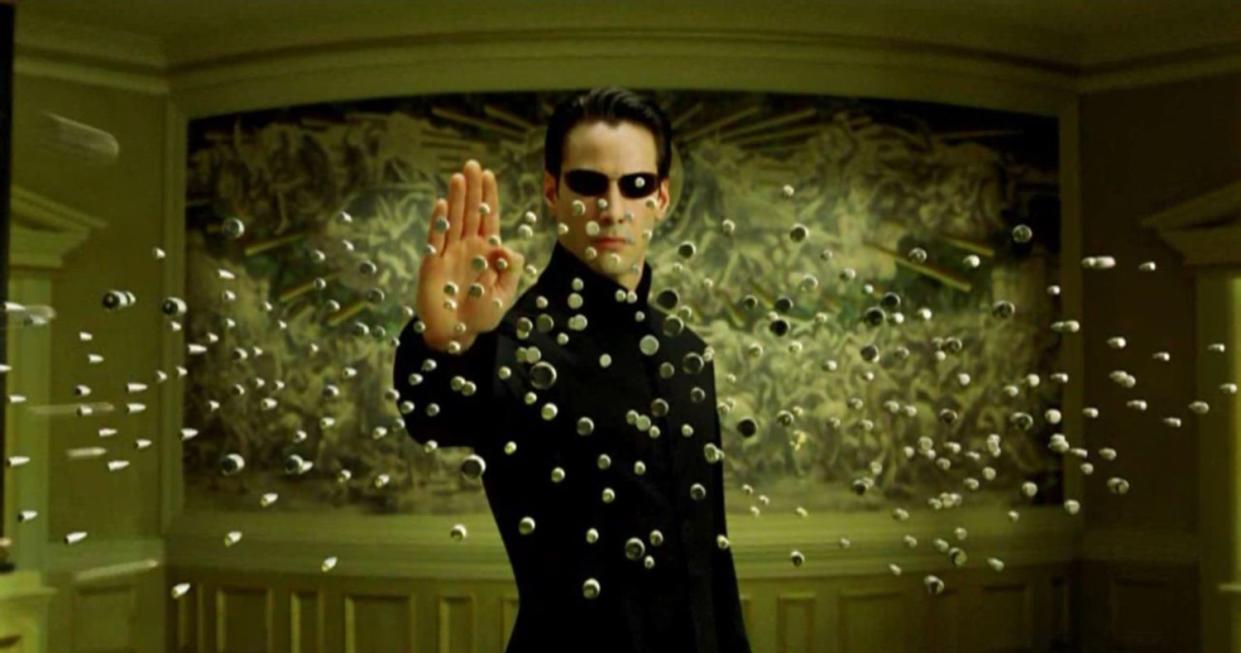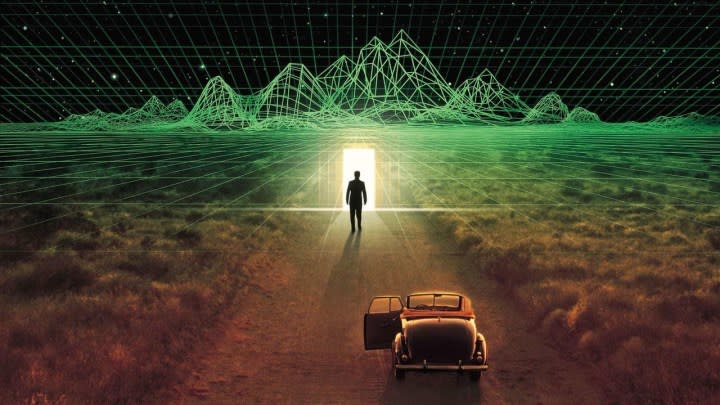25 years ago, The Matrix led a mini movement of sci-fi simulation thrillers

- Oops!Something went wrong.Please try again later.
- Oops!Something went wrong.Please try again later.
- Oops!Something went wrong.Please try again later.
One way to grasp how fully our relationship to computers changed over the 1990s is to look at the cyberthrillers Hollywood made during that time. Mass surveillance, identity theft, the hacking of the soul — all the nascent technological anxieties of this new era were uploaded to movie screens like a virus. But there was no stopping what was coming, and over just 10 years, a world merely flirting with mass connectivity went irreversibly online. By the end of the decade (and, by extension, the century and millennium), the internet had become a major part of everyday life for many people. In turn, the word of warning evolved at the movies. Suddenly, computers weren’t just threatening your safety, your privacy, and your humanity. They were replacing life itself.
In the spring of 1999, the American multiplex was inundated with variations on that scary conclusion. First came The Matrix, a savvy sleeper blockbuster that used irresistible pop philosophy as the Krazy Glue of its spirited genre pastiche. Mere weeks later, eXistenZ, a weird Canadian thriller, dabbled in similar ideas, while bending them into the less mainstream shape of a drolly deranged espionage movie. And a few weeks later still, on Memorial Day weekend, we got The Thirteenth Floor, a twisty neo-noir about realities within realities that had the misfortune of opening in the wake of not just Matrix mania, but also the box-office event that was Star Wars: Episode 1—The Phantom Menace.
You could say that all three movies, released in as many months, played with what would come to be known as the simulation hypothesis — the theory that reality as we know and experience it is actually a digital illusion. The notion, a newfangled upgrade on Plato’s allegory of the cave, gained momentum with the publishing of Nick Bostrom’s 2003 essay Are You Living in a Computer Simulation? But the movies got there earlier. And arguably, nothing has proliferated the idea in the public consciousness more than The Matrix, the rare Hollywood hit and FX-heavy action movie that could be said to have reshaped the way its audience thought about the world.
The Matrix (1999) Official Trailer #1 - Sci-Fi Action Movie
Like George Lucas, the Wachowskis found the fun and profitability in mashing up pet obsessions — in their case, everything from wire-work kung fu to Hong Kong bullet opera to the dystopian spectacles of The Terminator and Blade Runner. That’s part of the enduring popularity of The Matrix. Another is the malleability of its metaphor, which goes far beyond fears of losing ourselves by logging on. In 1999, it seemed of a piece with movies like Office Space and Fight Club in indicting the comfortable stability of the middle-class grindset life. Today, the film is widely understood as an allegory of gender dysphoria, even as legions of aggrieved men’s rights activists have tried to reclaim its famous “red pill” as a symbol of their whiny movement. Beyond specific interpretations, The Matrix offers a fantasy more comforting than the illusion of The Matrix itself: that the truly perceptive can see the world for what it really is.
The effects may have lost a little of their wow factor over the past 25 years (though not that much — the rippling glass face of the skyscraper still looks crazy cool). But few ’90s blockbusters have aged better, and not just because the film’s story of A.I. as an existential threat has new purchase in the here and now. The Matrix felt at the time like the rare cyberthriller made by people who understood the technology and the subculture of computers. Both may have evolved greatly in the years since, but there’s a timeless quality to the film’s tech-chic vision; it still feels very much in touch with the spirit of the digital age.
eXistenZ (Trailer)
By contrast, David Cronenberg made no attempt to place his simulation thriller on the cutting edge. In fact, eXistenZ is a luddite pervert’s take on technological paranoia, forgoing any semblance of verisimilitude in favor of characteristically squishy nightmare hardware. Here, plugging into a virtual reality world — the immersive video games navigated by Jennifer Jason Leigh and Jude Law — is a rather literal process involving invasive ports punched into the spine and organic gaming consoles with sex organs built from amphibian parts. It’s all so disgustingly physical in that classic Cronenberg way, though the manner in which the machines colonize the flesh as well as the mind isn’t so different from The Matrix’s human farming pods and parasite-tracking devices.
Cronenberg has no apparent interest in the mechanics or graphical particulars of video games; part of the dry joke of the film is that its virtual reality looks no more glamorous or any less glum than actual reality. Still, the writer-director has some fun with the conversational limits of A.I. What he really tapped into with eXistenZ was the extent to which gaming would become less about escapism and more about total immersion — how the world of a game would soon become realer to some players than their actual lives. Detractors have claimed that eXistenZ itself doesn’t seem like an especially fun game, that it’s too tedious and chore-heavy to be something people would really play. That’s just more proof of the film’s prescience: Long before Death Stranding, there was transCendenZ!

“Are we still in the game?” goes the final line of dialogue — a parting wink of ambiguity that doubles as a thesis statement on the increasingly blurred lines between real life and the unreality of the web. The Thirteenth Floor makes that question the whole show. Set in the distant future of (gulp) 2024, the film follows an amateur detective (Craig Bierko) investigating the mysterious death of an old colleague, in part by leaping into a simulated version of 1930s Los Angeles populated by NPCs that don’t know they’re NPCs. Though it was the last of this unofficial 1999 trilogy to hit theaters, The Thirteenth Floor reaches back further — in its ersatz prewar setting, in its origins as a remake of the 1970s German miniseries World on a Wire, and in the Descartes quote that opens the movie and previews its existential anxiety.
The Thirteenth Floor Official Trailer!
This poky, largely forgotten sci-fi detective yarn isn’t much more than a twist waiting to be not-so-shockingly revealed. (If you can’t get ahead of it, you too might be an NPC.) To the extent that it looks remotely like a glimpse into our actual 2024, it’s mostly the film’s vague relevance of presenting an online sandbox where users can trade their own identity for a new one; most of the actors do double and triple duty, playing their characters and their characters’ veritable Second Life avatars. Technologically speaking, it’s every bit as fanciful as the world of eXistenZ, but without the memorable grotesquery: People enter the simulation by laying in a chamber of chintzy green lasers.
Looked at one way, it’s the bleakest of its miniature movement. While The Matrix and eXistenZ present the digital world as a mirage swallowing humanity whole, The Thirteenth Floor basically concludes that humanity itself is the mirage. We’re all just lines of code in the machine, mistaking our programming for free will. There’s no waking from the Matrix. We are the Matrix.

At the same time, maybe there’s something darker and more premonitory about the other simulation thrillers of 1999, which both come close to concluding that we all willingly disappear into the code. The real villain of The Matrix isn’t Agent Smith, but (spoiler alert) Cypher, the turncoat played by Joe Pantoliano. His preference for the comfortable lie of the Matrix anticipated the myopia of online echo chambers, where truth is what you want it to be, and the illusions of Instagram, where it doesn’t matter if your dream life is “real” so long as it’s a dream. “Ignorance is bliss,” he says between bites of steak-flavored 1s and 0s. a quarter-century later, that sentiment sounds like prophecy, anticipating the subtext of social media feeds and comment sections alike.
The Matrix is currently streaming on Max. eXistenZ is currently streaming on Kanopy, Pluto TV, and Showtime. The Thirteenth Floor is available to rent or purchase from major digital services like Amazon Prime Video.

